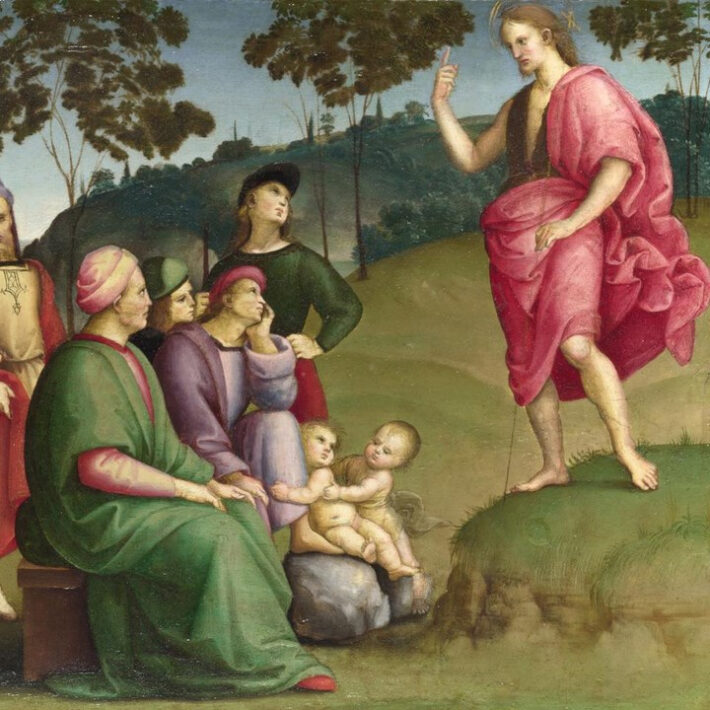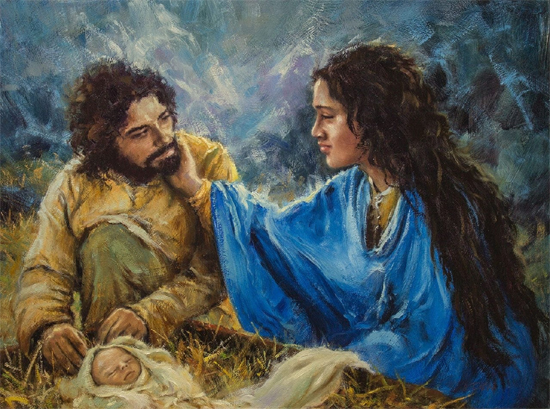Luke 7: 19-23
19 ¶ And John calling unto him two of his disciples sent them to Jesus, saying, Art thou he that should come? or look we for another?
20 When the men were come unto him, they said, John Baptist hath sent us unto thee, saying, Art thou he that should come? or look we for another?
21 And in that same hour he cured many of their infirmities and plagues, and of evil spirits; and unto many that were blind he gave sight.
22 Then Jesus answering said unto them, Go your way, and tell John what things ye have seen and heard; how that the blind see, the lame walk, the lepers are cleansed, the deaf hear, the dead are raised, to the poor the gospel is preached.
23 And blessed is he, whosoever shall not be offended in me.
John the Baptist has been imprisoned for speaking the truth about how the people should prepare themselves to be fit for the coming of the Kingdom. It may seem strange that he now sends to Jesus to ask him if he is indeed the one to come, the Messiah. Does John now doubt that Jesus is the Son of God?
Luke’s account of the baptism of Jesus by John differs from the other Gospels’. In John’s Gospel, John the Baptist sees Jesus approaching and immediately says: ‘Behold, the lamb of God, who takes away the sins of the world.’ In Mark and Matthew it is immediately on Jesus coming out of the water that the Spirit descends and a voice from heaven proclaims: ‘Thou are my beloved Son; with thee I am well pleased.’ And in Matthew, John is initially reluctant to baptize Jesus, saying that it is he who should be baptized by Jesus instead.
In Luke’s Gospel, the account of John’s arrest is placed first in the narrative, and so not following the chronological order of events. Luke then notes the baptism of all the people and Jesus also, ‘Jesus being baptised’, and then we are told, with a change in verb tense, that there is an unspecified period of time spent by Jesus in prayer before the heaven opens, while he is praying, the Spirit descends as a dove, and the voice from heaven proclaims Jesus as the Son of God. (The New Jerusalem Bible translates the verse as follows: ‘Now it happened that when all the people had been baptised and while Jesus after his own baptism was at prayer, heaven opened…’) We may recall that Christ’s praying is generally time spent alone with his father. There is no reason in Luke’s narrative to think that John must be present to witness this, or that Luke assumes he is.
It may then be that we be not entirely sure as to John the Baptist’s thoughts and intentions in sending to Jesus to ask him if he is the one to come. Is it that the understandings of the different evangelists are different? Is John the Baptist genuinely mystified by what is happening, or rather not happening, and so sends to Jesus to ask who he is, trusting Jesus to answer honestly? After all, while John has heralded the dawn of a new, Messianic age, even he may not have understood the full implications of his own teaching.
It is no doubt significant, in relation to these questions, that John’s sending messengers to Jesus is also related in Matthew’s Gospel (11: 2-6). We seem, then, to have through this a situation in which John has known of Christ’s divinity, he has hailed him as the Son of God, and now he seeks to know about the future. What is going to happen to Israel, to the Jewish people? Is the long time of waiting about to be fulfilled, in accordance with the teachings of the Prophets? Is Jesus going to restore the Jewish nation?
By way of response, Jesus in that very hour heals many people. What he says to John’s disciples next recalls verses from the prophet Isaiah which John would understand as an account of the signs of the coming of the Kingdom:
5 Then the eyes of the blind shall be opened, and the ears of the deaf shall be unstopped.
6 Then shall the lame man leap as an hart, and the tongue of the dumb sing…
THE Spirit of the Lord God is upon me; because the Lord hath anointed me to preach good tidings unto the meek; he hath sent me to bind up the brokenhearted, to proclaim liberty to the captives, and the opening of the prison to them that are bound;
2 To proclaim the acceptable year of the Lord, and the day of vengeance of our God; to comfort all that mourn. (Isaiah 35: 5-6, 61: 1-2)
To the poor the Gospel is preached – to those who lack material goods or social status, and to those who have found a certain spiritual poverty, coming to God humbly, knowing their own merits can not bring them to heaven, that it is only the gift of grace that may fulfil their lives. John’s questions are answered. The Kingdom of God is here.
‘Man does not see God by his own powers; but God of his own will appears to men, to whom he wills, and when he wills, and as he wills. For God can do all things: he was seen in former times prophetically through the Spirit, he is seen in the Son by adoption, and he will be seen in the kingdom of heaven as Father. The Spirit prepares man for the Son of God, the Son brings him to the Father, and the Father bestows on him incorruptibility for eternal life, which comes to everyone from his beholding God.’ St Irenaeus






